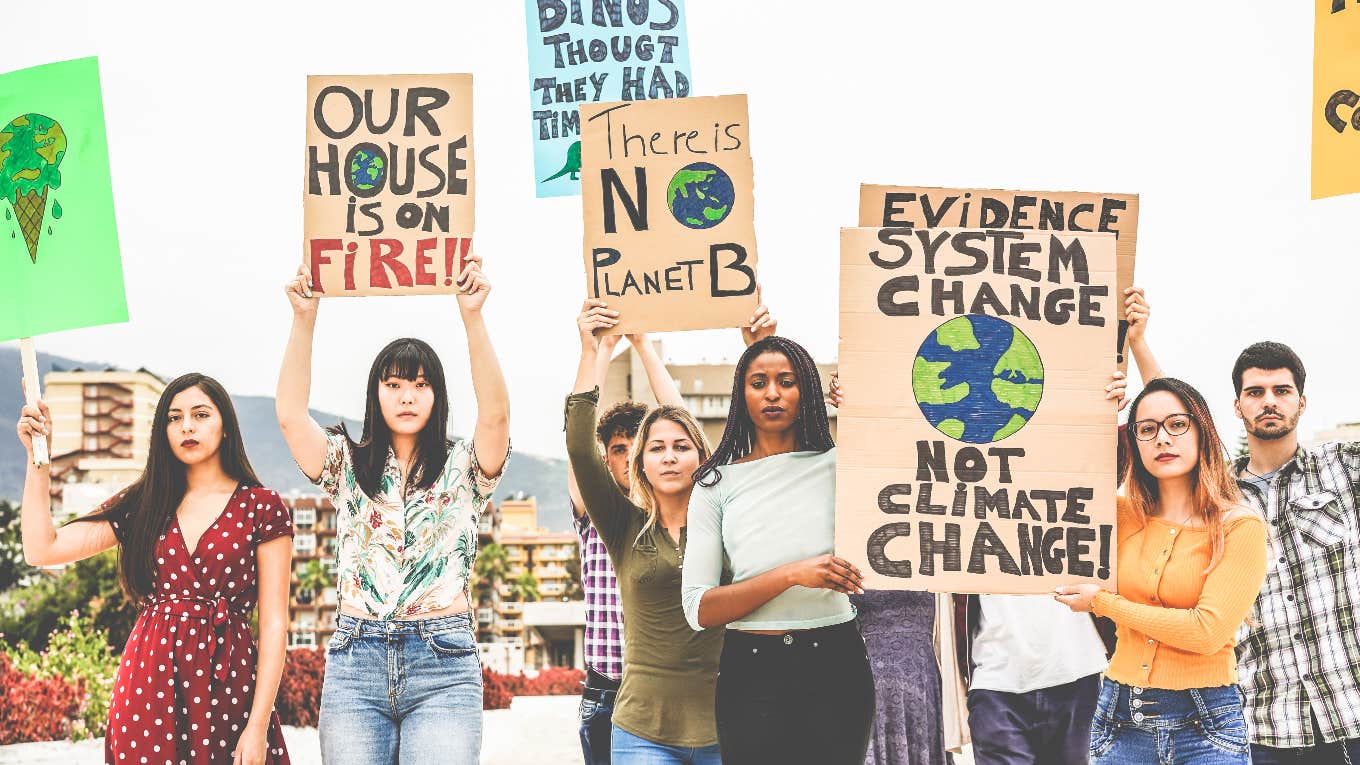Nearly Half Of Gen Zers & Millennials Are Quitting Their Jobs Because Of Climate Change
Climate anxiety is overwhelming, but young people are taking action.
 Tint Media / Shutterstock
Tint Media / Shutterstock Millennials and Gen Zers are often told by older generations that they’re lazy, entitled, and not willing to work hard. They’re told that's why they can’t buy a home or have any semblance of savings — not because of crushing student loan debt, wage stagnation, or the high cost of living pretty much everywhere.
In reality, millennials and Gen Zers inherited a world that's ripping apart at the seams. It feels like they're hurtling toward the abyss with no safeguards to break their fall.
So, despite how negatively younger generations are portrayed, they make life decisions that align with their strong moral compasses as their way of changing whatever small slice of the world’s trajectory they can.
Nearly half of Gen Z-ers and millennials are quitting their jobs because of climate change.
Global consulting firm Deloitte polled over 22,800 Gen Z-ers and millennials across 44 countries, taking account of what drives them, both professionally and personally. About 45% of Gen Z and millennials have quit a job or plan to quit a job because of concerns about climate change.
Among their list of anxieties, Gen Z and millennials named the high cost of living as their top concern, unemployment as their next concern, then climate change, mental health, and personal safety.
Climate anxiety is incredibly common among younger generations.
Climate anxiety is deep-seated and complex, yet it’s safe to say that the items on the above list are wholly interconnected, with access to resources at the root of everything.
In the past month, 62% of Gen Z and 59% of millennials said they’re anxious about the state of the planet, so much so that eco-anxiety is the basis for the direction they’re taking in the workplace.
Clinical psychologist and professor from Yale University, Sarah Lowe, defines climate anxiety as “distress about climate change and its impacts on the landscape and human existence.”
Lowe explained that climate anxiety can “manifest as intrusive thoughts or feelings of distress about future disasters or the long-term future of human existence and the world.”
Collective action around climate change lessens the anxiety more than individual action, like recycling or conserving electricity in your home. This observation illuminates the power we have when we come together for the collective good.
Atmospheric and oceanic scientist Paige Hoel tackled the existential dread that accompanies her work.
“If I’m being perfectly honest, the Earth has taken a lot of really crazy turns over the last four and a half billion years, and what we are doing to it now is scary and shocking; however, the Earth will still exist after all the changes we’ve made to it,” she said.
Hoel acknowledged that “humanity seems kinda screwed from a lot of different perspectives.”
“To me, it’s not a question of whether earth will make it … It’s a question of what humanity will look like,” she said.
In a beautiful and hopeful statement, Hoel shared a technique for navigating uncertainty: “The way I repackage that fear is thinking, ‘Okay, how can I help?’ Instead of letting this doom overwhelm inside of me."
She holds tight to her belief that she’s a great educator, someone who conveys “The wonder of the earth and the complexity of the climate, and I do that as much as I can.” She also holds space for being gentle with herself around climate justice, saying, “We cannot champion everything all the time.”
“At the end of the day, we only have so much energy, so with the energy that you have, what is the most valuable way you can spend it?”
Gen Z and millennials are expending their energy by putting pressure on institutions to create tangible change.
Less than 50% of Gen Z and millennials believe businesses have a positive impact on society, highlighting an extreme gap between their hope for the future and the reality of their lived experience.
Even with that dissonance, they’re not sitting idly by as temperatures rise and natural disasters become frighteningly frequent.
They’re holding the government accountable for their inaction, as 77% of Gen Z and 79% of millennials believe the government should push businesses to change their environmental policies.
Gen Z and millennials are taking action through forces they can control: Their jobs and their purchasing power. They’re literally putting their money where their mouths are and fighting for the future they want to see for everyone.
Alexandra Blogier is a writer on YourTango's news and entertainment team. She covers social issues, pop culture and all things to do with the entertainment industry.

